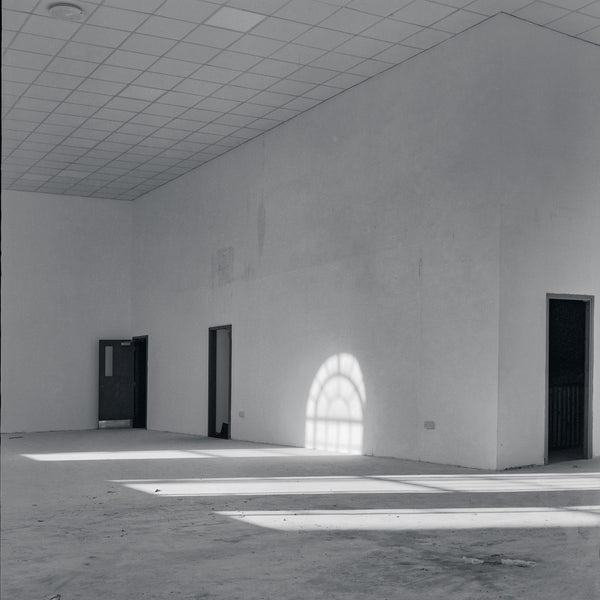Tell us a bit about yourself.
Hi, I’m Mike and I’ve been working at the shop for almost a decade. I enjoy binging sci-fi, mid-century design, mechanical watches and drinking too much coffee.

Minolta 9000 - Ilford HP5 (Pushed to 800 ISO)
How did you first get into photography?
Aside from generally taking some snaps without any thought behind them, my first experience with true photography was in college. I was studying fine art and our first project was black and white photography so that we could experiment with framing and composition. The photos came out terrible because the loaner camera (a terrible Pentax AF camera) had a huge light leak, but it left me wanting to try again. A little later on my parents invested in a digital Canon EOS camera for me that I used until the motor in the lens died from so much use. My first film camera came from a passing conversation with my grandfather one weekend, he said he might have a camera sitting around at home. A week later he brought over a Minolta 9000 with a 50mm f/1.7 he had bought when it was first released in 1985. It quickly became my everyday camera for a long time and looking back on it now, it’s when I started properly paying attention to my photography.
Minolta 9000 - Unknown film stock.
What drew you to film specifically?
It’s the fact that I only have so many photos per roll and I need to make them count, along with the unpredictability. The fact that I have to consider film stocks, what might be best for whatever situation I'm going to be in, and how to use that film best. Another factor for me is the monetary value that comes with using it, I find that I can take photos with a digital camera the whole day and get a few decent photos that I'm kind of happy with, but with film, I think a lot more and I take significantly fewer photos, but my hit rate of what I would consider a good photo or one that I would like to keep and not end on the cutting room floor is much higher. In short, I pay more attention with film.

Minolta XE-1 - Ilford HP5
Tell us a bit about your style of photography.
These days, I don't necessarily have a style of photography. I take photos as I go along my daily life really. For the most part, my daily camera is a Fujifilm X100V, as that's the one I can take as many photos as I want on and doesn't matter. For me, film is a better option if I'm going to a specific place or I've got a particular thing in mind… maybe I've seen something one day and want to take it on film paying more attention to it. That's sort of how I work around it. For me, film is how I separate out things that matter, the things that I think are worth more thought.

Tell us about the gear you have and your favourite cameras.
I try to keep my collection small and only own what I use. My daily driver is my Fujifilm X100V for the ease of use. If I’m shooting on film, I’ll usually pick up my Nikon F3 - especially if I’m looking for a convenient package that I can shoot quickly on. If I have a specific scene or subject I want to shoot, I’ll choose my Rolleiflex 2.8E, or if I’m feeling fancy, it’s my Leica M2. I find they all give me an enjoyable shooting experience that happens to also produce some really high-quality images. If I’m shooting people, I’ve found that the more classic cameras with chrome are much more approachable camera than others.

What is your favourite film stock?
Ilford XP2 for the ease of it. I find that it’s a very flexible stock for me, specifically its latitude, for example, and it still gives great results when pushed if needed. Because it’s C-41 it’s also very easy to develop, which is great for me as I’m terrible at developing at home. They just back up. I tend to just take it to Take It Easy, they develop it and I scan it at home. Although, I do still have a carrier bag of undeveloped film in the other room!

Rolleiflex 2.8E2 - Ilford XP2
What is your favourite thing about working at WYC?
There are many things I enjoy about working at West Yorkshire Cameras, but I particularly enjoy is tinkering around with old cameras. I enjoy learning about the inner mechanisms of a camera, such as how the film advance and shutter mechanisms, I want to know how a camera functions when I use it. I’m also really into old watches, which feeds into my love of precision mechanics. Something I really enjoy about this aspect of the job is that I can pick up something that might have never been used again and bring it back to life, from a paperweight to a fully functional camera.
Another aspect of this job I really enjoy is talking to the customers that come into the shop. We have a wide variety of demographic customers. From the older photographers that share some really interesting knowledge on the history of film photography to the total newcomers looking for their first point-and-shoot, I find that the people just getting into the hobby are the most interesting. I have noticed that these people have a perspective that is inspiring. They’re just able to have fun with it and not overthink everything. I feel like a lot of people who are really deep into this hobby tend to forget the joy that you can get from bringing a simple point-and-shoot to a party and getting fun, overexposed and out-of-focus photos.

Rolleiflex 2.8E2 - Ilford XP2
What would you say that you’ve learnt from working at WYC that you’d like to share?
I know it sounds cliché, but the camera doesn’t matter and nobody cares about which camera you own. Ultimately, a nice camera is nothing but a nice tool. You can still get great photos on cheaper cameras. It’s different if you’re a collector of cameras, but if I’m buying a camera for myself, I’ll consider whether there is a need to pay such a high price for a specific model. I’ll only put a chunk of money down on a camera if it does something my other cameras don’t or if there is no other affordable option. For example, I recently picked up a Horizon 202 camera. It’s no Hasselblad XPan, but it’s something that none of my other cameras do because it’s weird! You can create beautiful art on a cardboard box if you know what you’re doing.


